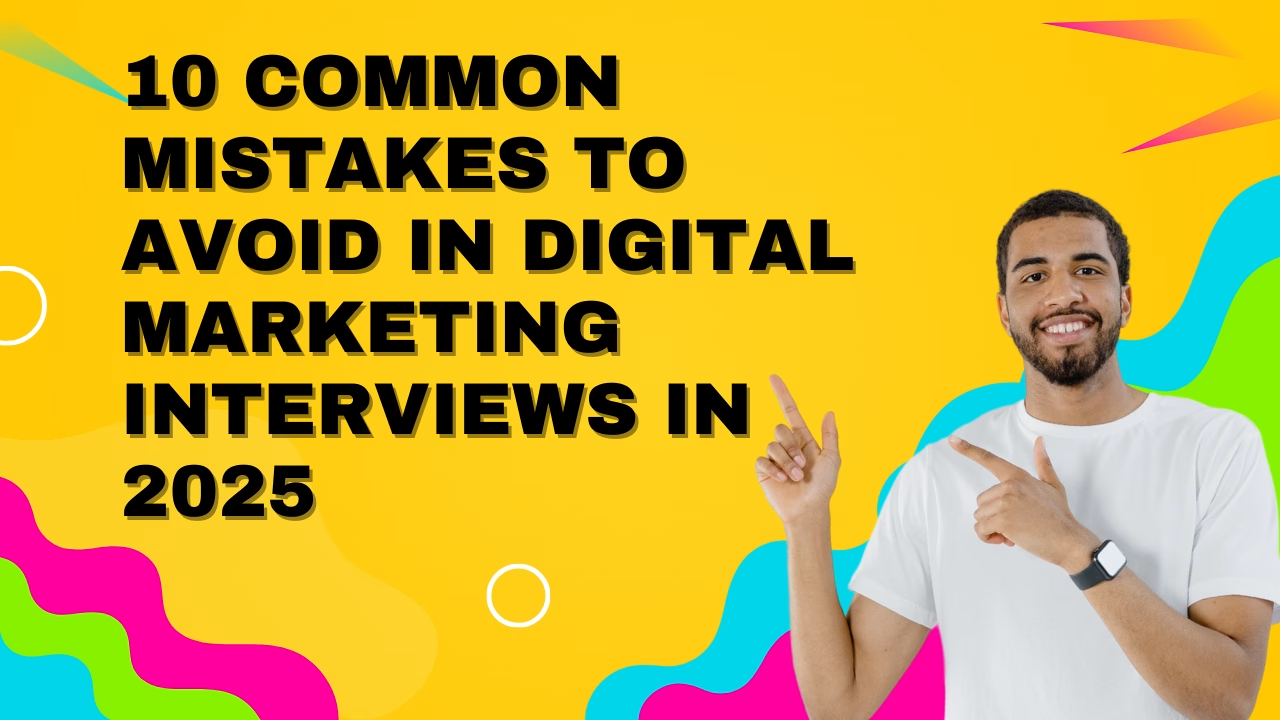10 Common Mistakes to Avoid in Digital Marketing Interviews in 2025

Digital marketing is a fast-evolving field, and landing a job in this competitive industry requires more than just a strong resume. It demands the ability to present your skills, experience, and strategic thinking effectively in interviews. Many candidates fail to make a lasting impression simply because they make avoidable mistakes. If you’re preparing for a digital marketing interview, steer clear of these ten common pitfalls to ensure your success.
“Success in digital marketing interviews comes down to preparation, creativity, and a deep understanding of the ever-changing industry trends.”
Lack of Research About the Company
Not taking the time to learn about the company’s mission, values, and digital presence can leave a bad impression. Companies expect you to know who they are, their target audience, and how they position themselves in the market. Without this knowledge, your answers will likely sound generic and uninspired. Interviewers want to see how you can align your skills with their goals, and research is key to making that connection.
Pro Tip: Visit the company’s website, explore their blog, and check their social media accounts. Use tools like SEMrush to analyze their SEO and content strategy to get a deeper understanding. Identify recent campaigns and think about how you could contribute to their future strategies.
Not Understanding Basic Digital Marketing Concepts
Digital marketing involves a variety of strategies, and not knowing the basics will make you seem unprepared. For example, if you can’t explain what SEO or PPC means or how they impact a marketing campaign, it’ll show you lack foundational knowledge. Understanding how different components like content marketing, analytics, and social media work together is crucial.
Pro Tip: Brush up on fundamental concepts like SEO, social media marketing, content marketing, and analytics. Use free resources like Google’s Digital Garage or HubSpot Academy. Practice explaining these concepts in simple terms to demonstrate your understanding during the interview.
Exaggerating Your Experience
Stretching the truth about your skills might seem like a good idea, but it can backfire when you’re asked for details. For example, if you claim to have managed large budgets in Google Ads but can’t answer specific questions, it’ll damage your credibility. Authenticity is valued more than exaggeration, and honesty can open doors for opportunities to learn on the job.
Pro Tip: Be truthful about your experience. If you’re still learning a particular tool, emphasize your willingness and ability to learn quickly. Share examples of smaller projects you’ve worked on and how they’ve helped you build a strong foundation.
Ignoring Data-Driven Marketing
Modern digital marketing is all about using data to make decisions. If you ignore metrics like Click-Through Rates (CTR), Conversion Rates, or Return on Investment (ROI) during discussions, the interviewer may doubt your analytical skills. Data provides the backbone for successful campaigns, and showing you can interpret and act on it is vital.
Pro Tip: Familiarize yourself with key performance indicators (KPIs) and think of examples where you used data to improve a campaign’s performance. Prepare to discuss specific numbers and outcomes to demonstrate your analytical mindset.
Poor Understanding of Digital Tools and Platforms
Digital marketers rely on tools like Google Analytics, Facebook Ads Manager, and email marketing platforms. If you can’t discuss how you’ve used these tools, it may indicate a lack of hands-on experience. Proficiency in tools shows you can hit the ground running and contribute immediately.
Pro Tip: Practice using popular tools and prepare to discuss specific campaigns where these tools were essential. Highlight any certifications you have, such as Google Ads or HubSpot certifications, to reinforce your expertise.
Failing to Showcase Creativity
Creativity is a key skill in digital marketing. If you can’t share examples of innovative campaigns or ideas you’ve contributed to, the interviewer might think you’re not proactive or resourceful. Creativity isn’t just about flashy ideas—it’s also about problem-solving and finding unique ways to reach audiences.
Pro Tip: Think about your past projects and highlight instances where your creativity led to successful results. Even a unique social media post, a clever email subject line, or an out-of-the-box content strategy can make a big impression. Be ready to explain the thought process behind your ideas.
Overlooking Social Media Trends
Being unaware of current social media trends can make you seem out of touch. For instance, not knowing about Instagram Reels or TikTok’s growing influence might indicate you’re not keeping up with the industry. Digital marketing is dynamic, and staying updated shows you can adapt to change.
Pro Tip: Stay updated with platforms like Social Media Today or follow digital marketing influencers to stay in the loop. Share examples of how you’ve leveraged recent trends in your past work or ideas for future campaigns.
Not Asking Relevant Questions
When given the chance to ask questions, failing to do so shows a lack of interest. It’s also a missed opportunity to learn about the role and company. Thoughtful questions show you’re engaged and serious about the position.
Pro Tip: Prepare questions in advance, like “What’s the biggest challenge your digital marketing team faces?” or “What tools does your team rely on the most?” You can also ask about recent campaigns or future plans for the company’s digital strategy.
Ignoring Personal Branding
Your online presence acts as your digital resume in this field. An incomplete LinkedIn profile or outdated social media accounts can work against you. Employers often look at your online presence to gauge your professionalism and expertise.
Pro Tip: Update your LinkedIn with relevant skills and experiences. If possible, create a personal blog or portfolio showcasing your work. Share industry insights and engage with posts to show your active interest in digital marketing.
Failing to Prepare for Behavioral Questions
Behavioral questions often focus on how you’ve handled challenges in the past. Not preparing for these can lead to vague or unconvincing answers. These questions are designed to assess your problem-solving, communication, and teamwork abilities.
Pro Tip: Use the STAR method (Situation, Task, Action, Result) to structure your answers. Think of real scenarios that demonstrate your problem-solving and teamwork skills. Practice answering questions like, “Can you describe a time when a campaign didn’t perform as expected, and what you did to address it?”
Conclusion
Digital marketing interviews are your chance to showcase not just your technical skills but also your strategic thinking and passion for the field. Avoiding these ten mistakes can significantly improve your chances of landing your dream role. Remember to research the company, stay updated on digital marketing trends, and present yourself as a confident and competent candidate. By doing so, you’ll leave a lasting impression and set yourself apart from the competition.




